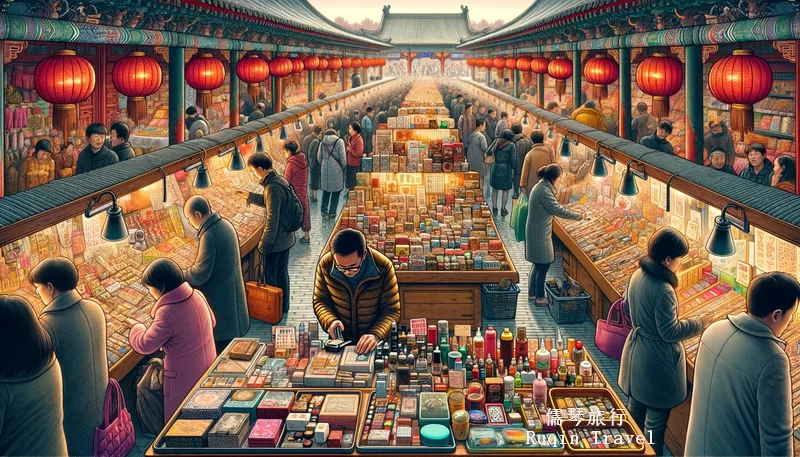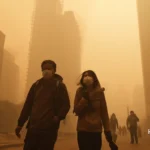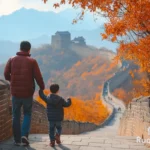Beijing: A Traveler’s Paradise with Caution
Plan your Beijing tour? Beijing is a treasure trove of history and culture, attracting travelers from around the world. While Beijing is generally a safe destination, it’s important to stay vigilant against certain scams that target tourists.
Awareness and caution are your best allies in avoiding these traps. This “The 10 Most Common Scams in Beijing” guide highlights the biggest scams in Beijing, helping you to have a memorable and trouble-free experience in this dynamic city.
1. Tea House Scam
Beware the Costly Cup of Tea
In tourist-heavy areas like Tiananmen Square, friendly locals might invite you for a tea ceremony, a guise for an expensive trap. The ceremony, under the pretense of cultural exchange, ends with an exorbitant bill.
They might suggest splitting the cost, but this is part of their deceit. To avoid falling victim to this scam, kindly decline such invitations, no matter how genuine they seem. Engaging in casual conversations is fine, but be wary of any invitations to secluded or unknown places. This is one of the most common scams in Beijing.
2. Fake Monks
Not All Monks Are Holy
Fake monks are common in tourist spots, exploiting the sanctity of religion to scam people. These imposters, dressed in monk attire, aggressively seek donations. They use the guise of spirituality to evoke empathy and generosity.
To avoid this scam, it is best to refrain from engaging or donating money. If you wish to make a charitable contribution, consider doing so through established and reputable organizations where your donation can make a genuine difference.
3. Taxi Scams
Navigate Taxi Travails with Care
While official taxis are generally safe, some drivers may take longer routes or use rigged meters to overcharge. Be particularly cautious at airports, where unofficial drivers often overcharge unsuspecting tourists. If a taxi driver insists on not using the meter, it’s best to find another cab.
Additionally, beware of ‘black’ taxis near tourist attractions; they are unlicensed and can charge exorbitant rates. If a driver ever asks for your help outside the taxi, be alert as it could be a tactic to steal your belongings.
4. The Art Student Scam
Art Scams: More Common Than Masterpieces
Young individuals, often claiming to be art students, may invite you to their galleries. This invitation usually leads to high-pressure sales tactics for overpriced art. These scammers are persuasive, making it hard to refuse. However, remember that genuine art students are unlikely to solicit tourists.
To avoid these scams, kindly decline offers to visit private galleries or art shows, particularly if you meet these individuals at tourist landmarks or public transportation hubs.
5. Counterfeit Money
Fake Bills: A Real Problem
Counterfeit currency is a significant issue in busy tourist areas. Always inspect bills carefully, especially larger denominations received from taxis or small shops. Learn to identify the key features of legitimate Chinese currency to avoid accepting fakes.
If you’re unsure about a bill’s authenticity, it’s safer to politely refuse it and ask for another one. Keeping small denominations handy for everyday transactions can also help minimize the risk of receiving counterfeit money.
6. Overpriced Tours
Tour Traps: Pay More, Get Less
Beware of unofficial guides offering tours at major attractions. These tours often come with inflated prices and disappointing experiences, including unscheduled stops at souvenir shops.
To avoid this, book tours through reputable companies. Remember, low-priced tours often equate to substandard services and experiences. A well-organized tour not only saves you time but also enhances your travel experience, providing you with deeper insights into Beijing’s rich history and culture.
7. Fake Money Exchange Scam
This scam involves street vendors or unofficial money exchangers who offer better exchange rates than banks. Once you hand over your money, they may give you counterfeit currency or shortchange you during the exchange.
Tip: Always exchange currency at official banks or recognized currency exchange counters.
8. Friendship Scam
False Friendships with Costly Consequences
In areas like Tiananmen Square and Forbidden City, beware of overly friendly locals who might lead you into costly situations. Their friendliness can be a facade for scams involving overpriced food, drinks, or services. If someone is overly insistent on accompanying you or showing you around, it’s best to decline politely.
Always trust your instincts; genuine friendliness is different from someone who has an ulterior motive. Remember, not everyone who approaches you with a smile has good intentions.
9. Shopping Scams
Marketplace Misleads
In tourist markets, vendors may sell counterfeit or low-quality products at inflated prices, especially to unsuspecting tourists. Before purchasing, do your research to understand the fair value of items. Haggling is common, so don’t be afraid to negotiate.
Be particularly cautious with electronics and branded goods, as these are often imitations. It’s better to shop at reputable stores or markets known for genuine products to ensure you get quality items for your money.
10. Fake Ticket Sellers
At major tourist attractions like the Great Wall or the Summer Palace, you might encounter people selling discounted tickets outside the official ticket booths. These tickets are often fake or invalid, leaving you without entry after you’ve paid.
Tip: Always buy your tickets directly from official ticket counters or through legitimate travel agencies.
Being aware of the 10 most common scams in Beijing can make your trip safer and more enjoyable. Stay vigilant, trust your instincts, and enjoy the rich culture and history this magnificent city has to offer. Remember, an informed traveler is a safe traveler!
More China Survival Guide
Planning China tour ? Our China Survival Guide offers essential tips and advice to help you navigate the country with confidence. From cultural etiquette and transportation tips to staying healthy and avoiding common scams.



